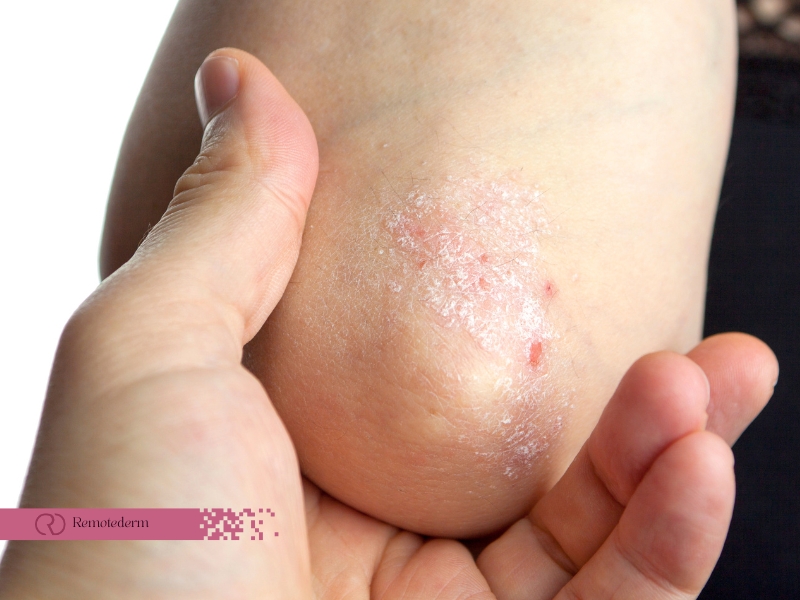Psoriasis affects about 1 million Canadians and 125 million individuals worldwide according to the Canadian Dermatology Association. While it is considered a lifelong disease with no known way of psoriasis prevention, there are some known facts about reducing its effects. In this article we would try to unravel some of the most important facts on the question of how you can prevent psoriasis flare-ups.
What is Psoriasis?
Psoriasis is one of the common skin diseases with a major genetic component that presents in multiple forms such as plaque, flexural and guttates. Psoriasis is an auto-immune inflammatory disease, and factors such as stress, a bug bite, and cold temperatures can trigger psoriasis.
Psoriasis can manifest in multiple forms like genital psoriasis and facial psoriasis among others.
Since each person is unique, the triggers may work differently for each person.
Causes of Psoriasis
Psoriasis is not contagious and there aren’t clear risk factors, but people can experience triggers that cause flare-ups. Triggers vary in individuals but may include:
- Certain medications
- Smoking
- Obesity
- Infections
- Cold weather
- Sunburn or skin injury
Importance of Psoriasis Prevention
As mentioned, psoriasis is an auto-immune condition that can affect the entire body and shouldn’t be left untreated.
Can You Prevent Psoriasis?
The short answer would be no, you can’t prevent it from happening since it is considered to be an auto-immune disease highly related to genetics, however, there are ways of reducing its effects and severity.
How Can You Prevent Psoriasis Flare-Ups?
Lifestyle choices like alcohol intake, smoking, stress, lack of sleep, and diet may affect psoriasis severity. One of the most important known triggers for individuals living in Canada would be the extreme cold weather conditions.
1. Dietary Considerations
There are a number of ways in which a healthy diet can help manage symptoms and reduce the chance of developing comorbidities. However, males consuming large amounts of alcohol typically have poorer results with psoriasis therapies.
.
2. Quitting smoking
Researchers have found that psoriasis patients who smoked and quit smoking could potentially develop fewer psoriasis flares.
3. Maintaining a healthy weight
If you are overweight, losing weight can reduce your psoriasis flare-ups and it may also improve how well your psoriasis treatment works.
4. Stress management
It is suggested to use certain remedies like yoga, meditation, and writing down your thoughts in order to help your overall mental well-being and also prevent psoriasis flare-ups.
Psoriasis Diet Guide
A healthy diet would be great for everyone but in this section we would give some special tips for a helpful psoriasis diet guide.
Anti-Inflammatory Foods to Include
Anti-inflammatory foods are thought to lessen the symptoms of psoriasis:
- Fruits and vegetables, particularly leafy greens, berries, and cherries
- Omega-3 fatty acid-rich seafood, such as salmon and sardines
- Spices and herbs high in antioxidants, such as ginger, cumin, and thyme
- Heart-healthy fat sources: nuts, seeds, and olive oil
Inflammatory Foods to Avoid
Some foods can make inflammation worse. Consume less of these:
- Processed foods and refined sugars
- Fatty red meat
- Dairy

Preventing Psoriasis: Daily Habits
Daily habits can greatly impact psoriasis prevention attempts. Healthy habits such as the following may have some extra benefits:
- Skin care routines: When creating your psoriasis skin care routine, use gentle products that add moisture and prevent dryness or irritation. It’s also important to avoid ingredients that can trigger your symptoms, like alcohol or fragrances.
- Importance of hydration: Staying hydrated can help to soothe the inflammation and itchiness associated with psoriasis.
Medical Approaches to Psoriasis Prevention
There are some well known medical remedies for Psoriasis such as:
- Exposure to controlled wavelengths of artificial light or direct sunshine known as phototherapy or bright light therapy.
- Usage of methotrexate which is a suppressor of the immune system and a chemotherapeutic drug.
- An oral medicine that lowers skin cell production called Acitretin.
However, no method is to be used without consulting with a dermatologist first. Whether you live in a remote area or can’t find the time for an in-person visit or you just feel shy, an online psoriasis dermatology service can help you greatly.
Differences Between Eczema and Psoriasis
Eczema and psoriasis are often confused due to their similarities. However, neither is contagious to others. If you’re wondering, “Eczema, can it spread?” The answer is yes, but only to other parts of your body during flare-ups. Eczema primarily causes itching and appears in body folds, while psoriasis can cause itching, stinging, or burning, and typically shows up on elbows, knees, scalp, face, and lower back.
Final Thoughts
Considering the genetic nature of Psoriasis as a lifelong skin disease there would be no ways to stop it from happening, but with the help of a healthy diet, a well taken care of skin and a healthy lifestyle, it can be managed so that the effects of it would be reduced. Since it is related to the immune system it is highly advised that in case of it happening any person would talk to a doctor as soon as possible.
FAQs
1. Can diet impact psoriasis prevention?
Yes, diet can significantly impact psoriasis. A balanced diet rich in anti-inflammatory foods can help reduce flare-ups and improve overall skin health.
2. Is psoriasis contagious?
No, psoriasis is not contagious. It is an autoimmune condition and cannot be spread from person to person through contact.
3. Does weather affect psoriasis?
Yes, weather can affect psoriasis. Cold, dry weather can worsen symptoms, while moderate sunlight may help improve the condition.
4. Can stress cause psoriasis flare-ups?
Yes, stress is a common trigger for psoriasis flare-ups and managing it through meditation and exercise can help in preventing psoriasis.
